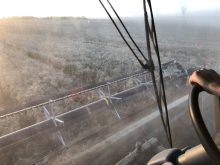Prairie farmers who want to dispute a grain elevator’s call on their grain’s grade and dockage now officially have up to a week to do so.
The Canadian Grain Commission on Oct. 3 announced amendments to the Canada Grain Regulations are now in effect allowing grain growers more time — seven calendar days, to be exact — to ask for the CGC to make a “final quality determination” on their grain.
Farmers have long been allowed to ask for those determinations — a process formerly known as “Subject to Inspector’s Grade and Dockage” — in the event of a dispute on their deliveries into CGC-licensed primary elevators.
Read Also

Alberta harvest wrapping up: report
Harvest operations advanced to 96 per cent complete in Alberta as of Oct. 7, with only a few late-seeded cereal and canola fields remaining, according to the latest provincial crop report.
Under the Canada Grain Act, farmers who disagree with the licensed elevator’s assessment have the right to ask for a sample to be sent to the CGC for a binding decision on that delivery’s grade and dockage.
Until now, however, that process required that a farmer had to request binding determination right at the time of delivery.
Apart from spotting producers the new seven-day window, the amendments made to sections 34 and 36 of the Grain Regulations also remove the obligation for a sample to be taken in the presence of the person delivering the grain, unless the producer asks to be present.
The CGC on Oct. 3 said the new amendments also clarify how long samples must be stored and allow “more flexibility for producers and elevator operators to decide who will store delivery samples and where.”
CGC chief commissioner Doug Chorney on Oct. 3 described final quality determination as an “important producer right,” and said the rules now reflect “the realities of today’s grain sector.”
The amendments, he noted, are in response to feedback received during the federal government’s ongoing Grain Act review. The changes now in place were first proposed back in December and were subject to an 11-week public consultation that ran through to the end of February.
The CGC in December noted “grain delivery and handling processes have changed. Producers are often not present when their grain is delivered to the licensed primary elevator. Third parties, such as commercial truck drivers, are increasingly being hired to deliver grain into the licensed elevator system.”
In its consultations, the federal government said, “many suggested that somewhere between five to 14 business days was an appropriate window of eligibility” in which a farmer could launch the dispute process.
The government acknowledged in August last year that these aren’t the only changes farmers have sought to the “Subject to Inspector’s Grade and Dockage” process during its Grain Act consultations.
For example, the government said at the time, “many” respondents also want to see an expansion of the quality characteristics eligible for such assessments — because grain contracts are “increasingly specifying non-grade factors” such as deoxynivalenol (DON) level and falling number for wheat.
Farmers had also said they’d like to see their right to access binding determination expanded to include “other classes of CGC licensees,” such as processing elevators and grain dealers. More processing facilities have been going up on the Prairies in recent years, farmers said in the consultations, and more such plants are on the way. — Glacier FarmMedia Network

















